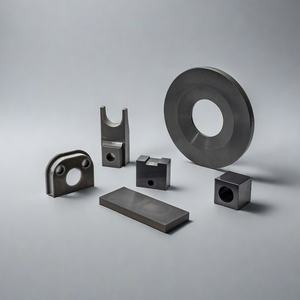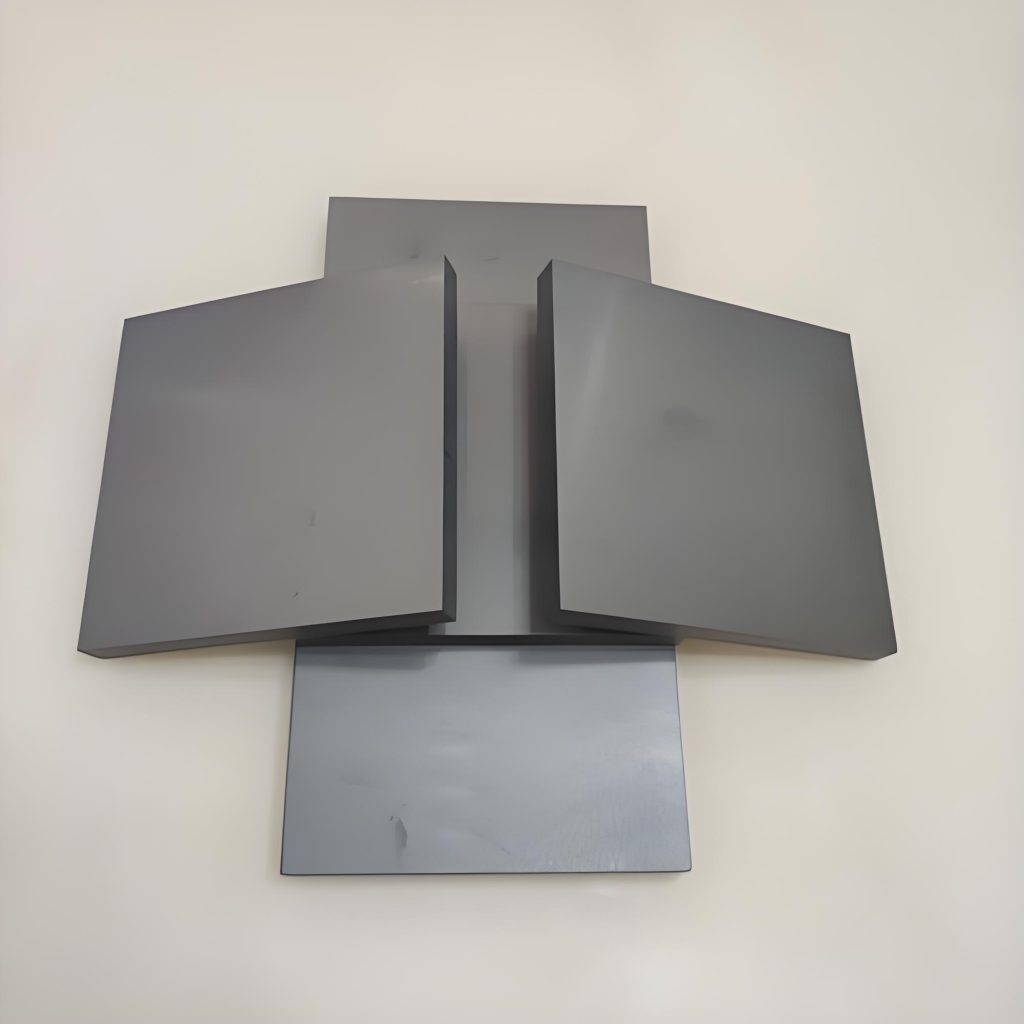Discover Premium Ceramic Products | Durability & Elegance United | Advanced Ceramics
PRODUCT PARAMETERS
Description
Overview of Boron Carbide B4C Plate:
Boron carbide (B₄C) is one of the hardest known materials, second only to diamond and cubic boron nitride. It has a high melting point, excellent wear resistance, and remarkable hardness, making it an ideal material for various applications requiring extreme durability and strength. Boron carbide plates are fabricated from this material, often used in industries where protection against abrasion, impact, and high temperatures is crucial.
Features of Boron Carbide B4C Plate:
Boron Carbide (B₄C) plates are known for their excellent properties for a variety of high-performance applications. The key features of boron carbide plate are described in more detail below:
Extremely high hardness
Vickers hardness: approximately 35 GPa, one of the hardest known materials after diamond and cubic boron nitride.
Wear Resistance: Extremely resistant to abrasion, making it ideal for applications involving severe friction or erosion.
High melting point
Melting Point: Approximately 2450°C (4442°F), maintaining structural integrity in very high-temperature environments
Thermal Stability: Stable at elevated temperatures without significant degradation, making it suitable for high-temperature industrial processes.
Low Density
Density: Approximately 2.52 g/cm3, relatively low compared to many other ceramics and metals.
Weight Reduction: Significant weight reduction benefits, critical for mass-demanding applications such as aerospace and personal armour.
Excellent chemical stability
Corrosion resistance: Highly resistant to most acids and alkalis, providing excellent protection against chemical attack.
Stability in harsh environments: Maintains performance in aggressive environments such as corrosive substances.
Moderate thermal conductivity
Heat Dissipation: Moderate thermal conductivity to efficiently transfer heat away from critical components.
Electrical insulation
Insulating properties: Effective as an electrical insulator for electronic and electrical applications requiring insulation.
Neutron Absorption
High neutron capture cross section: Excellent neutron absorption makes it valuable in nuclear applications, especially as a control rod and shielding material.
Mechanical Strength
Compressive Strength: Extremely high compressive strength allows for durability under heavy loads.
Brittleness: Although hard, boron carbide is brittle, which can be a limitation in applications involving high impact. However, this can be mitigated by design considerations and composite construction.
Acoustic Properties
Sound Damping: This has good sound-damping properties, which can reduce noise transmission in some applications.
Biocompatibility
Medical Applications: Some forms of Boron Carbide have been used for biomedical applications due to its biocompatibility and corrosion resistance.
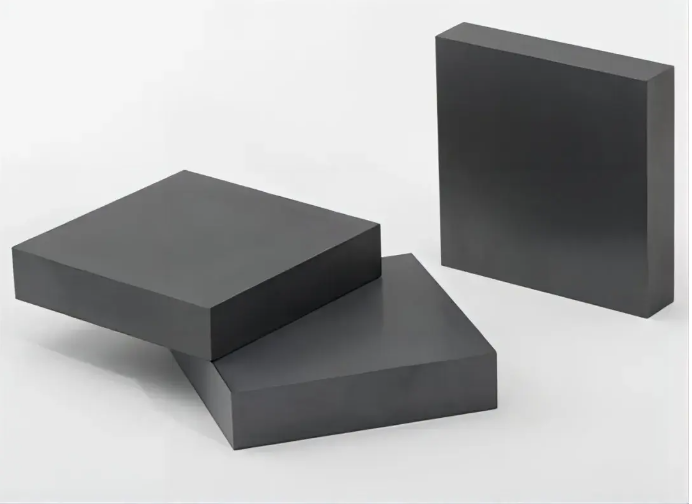
Boron Carbide B4C Plate
Specifications of Boron Carbide B4C Plate:
| Property | Specification |
| Chemical Formula | B₄C |
| Hardness (Vickers) | ~35 GPa |
| Density | 2.52 g/cm³ |
| Melting Point | 2450°C (4442°F) |
| Thermal Conductivity | 27-129 W/m·K (depending on purity and orientation) |
| Thermal Expansion Coefficient | 6.5 × 10⁻⁶ K⁻¹ |
| Electrical Resistivity | High (acts as an electrical insulator) |
| Compressive Strength | > 3.5 GPa |
| Tensile Strength | Relatively low due to brittleness |
| Modulus of Elasticity | 460-500 GPa |
| Fracture Toughness | Low (~3 MPa·m^(1/2)) |
| Chemical Stability | Highly resistant to most acids, alkalis, and molten salts |
| Neutron Absorption Cross Section | High (~760 barns for natural boron) |
| Corrosion Resistance | Excellent in most environments |
| Acoustic Properties | Good sound damping characteristics |
| Biocompatibility | Generally considered biocompatible |
| Environmental Impact | Non-toxic; long service life reduces replacement frequency |
| Manufacturing Process | Hot pressing, sintering, reaction bonding |
| Typical Applications | Armor plating, abrasive materials, nuclear applications, industrial wear parts |
Applications of Boron Carbide B4C Plate:
Military and Defense
- Personal Armor: Boron carbide plates are widely used in body armor for soldiers and law enforcement personnel. Their high hardness and lightweight nature make them ideal for ballistic protection.
- Vehicle Armor: Used in armored vehicles, including tanks and military transport vehicles, to protect against projectiles and shrapnel.
- Aircraft Armor: Integrated into aircraft structures to protect critical components from damage during combat or accidents.
Industrial Wear Parts
- Nozzles and Dies: Due to its extreme hardness and wear resistance, boron carbide is used in manufacturing nozzles for abrasive blasting, extrusion dies, and injection molding tools.
- Bearings and Seals: These are used in bearings and seals that operate under harsh conditions, such as high temperatures and corrosive environments.
- Cutting Tools: Incorporated into cutting tools like saw blades and drill bits for materials that are difficult to machine.
Abrasive Materials
- Grinding Wheels: Boron carbide grains are embedded in grinding wheels for machining hard metals and ceramics.
- Polishing Compounds: Used in polishing compounds for precision finishing of optical lenses, semiconductors, and other high-tolerance surfaces.
- Sandblasting Media: Ideal for sandblasting operations where durability and efficiency are crucial.
Nuclear Industry
- Radiation Shielding: Used in shielding materials to protect against neutron radiation in various nuclear facilities.
Space and Aerospace
- Satellite Components: Lightweight yet strong, boron carbide plates are used in satellite structures and components where weight savings are critical.
- Thermal Protection Systems: Applied in thermal protection systems for spacecraft re-entry vehicles, protecting against extreme heat generated during atmospheric re-entry.
Automotive Industry
- Brake Pads: Some high-performance brake pads incorporate boron carbide to enhance braking performance and durability.
- Engine Components: Used in engine parts that require high wear resistance and thermal stability, such as piston rings and valve seats.
Medical Devices
- Biocompatible Implants: While less common, some forms of boron carbide have been explored for biomedical applications due to their biocompatibility and ability to resist corrosion.
- Dental Instruments: These are used in dental instruments that need to be both durable and non-corrosive.
Mining and Construction
- Mining Equipment: Used in mining machinery parts that are exposed to abrasive materials, such as conveyor belts, chutes, and hoppers.
- Construction Tools: Incorporated into construction tools like jackhammers and rock drills to improve durability and performance.
Electronics
- Heat Sinks: Benefiting from its moderate thermal conductivity and electrical insulation properties, boron carbide can be used in heat sinks for electronic devices.
- Insulating Components: Acts as an insulator in various electronic components, protecting electrical shorts and overheating.
Scientific Research
High-Temperature Furnaces: Employed in furnace linings and components that must endure high temperatures without degrading.
Experimental Reactors: Used in experimental reactors and research facilities for their ability to withstand extreme conditions.
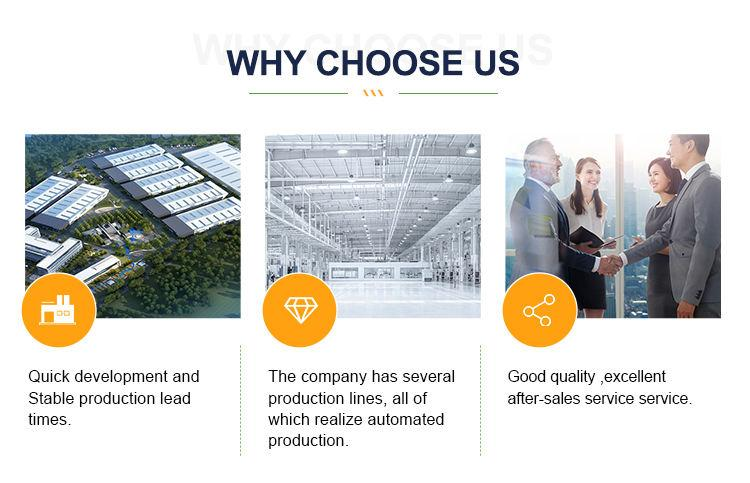
Company Profile
Advanced Ceramics founded on October 17, 2012, is a high-tech enterprise committed to the research and development, production, processing, sales and technical services of ceramic relative materials and products. Since its establishment in 2012, the company has been committed to providing customers with the best products and services, and has become a leader in the industry through continuous technological innovation and strict quality management.
Our products includes but not limited to Boron Carbide Ceramic Products, Boron Nitride Ceramic Products, Silicon Carbide Ceramic Products, Silicon Nitride Ceramic Products, Zirconium Dioxide Ceramic Products, etc. Please feel free to contact us.(nanotrun@yahoo.com)
Payment Methods
T/T, Western Union, Paypal, Credit Card etc.
Shipment Methods
By air, by sea, by express, as customers request.

FAQs of Boron Carbide B4C Plate
1. What is boron carbide?
Answer: Boron carbide (B₄C) is a ceramic material known for its extreme hardness, high melting point, and excellent wear resistance. It is one of the hardest materials after diamond and cubic boron nitride.
2. What are the main applications of boron carbide plates?
Answer: Boron carbide plates are used in various industries, including:
Military and defense (personal and vehicle armor)
Industrial wear parts (nozzles, dies, bearings)
Abrasive materials (grinding wheels, polishing compounds)
Nuclear industry (neutron absorbers, radiation shielding)
Space and aerospace (satellite components, thermal protection systems)
Automotive (brake pads, engine components)
3. Is boron carbide suitable for high-temperature applications?
Answer: Yes, boron carbide has an exceptionally high melting point and can maintain its structural integrity at very high temperatures, making it suitable for applications involving extreme heat.
4. How does boron carbide compare to other hard materials like diamond and cubic boron nitride?
Answer: While boron carbide is not as hard as diamond or cubic boron nitride, it offers a better balance between hardness and cost. Additionally, it has superior thermal stability and chemical resistance compared to many other ceramics.
5. Can boron carbide plates be easily machined or shaped?
Answer: Machining and shaping boron carbide can be challenging due to its extreme hardness. Specialized tools and techniques, such as diamond grinding or laser cutting, are typically required. This can increase production costs and complexity.
REQUEST A QUOTE
RELATED PRODUCTS
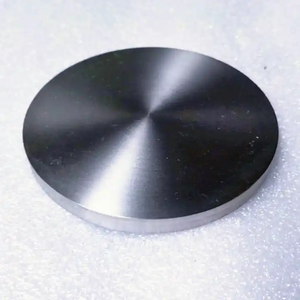
SW40mm Curved Hexagonal Boron Carbide B4C Body protection Ceramic Plate
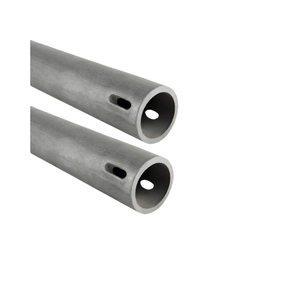
Customized High Hardness Boron Carbide Ceramic Tubing B4C Nozzle
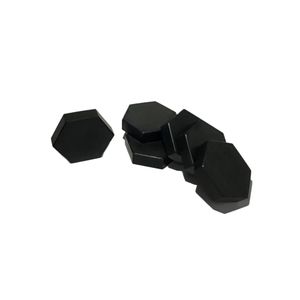
Boron Carbide Ceramic Wet Sandblasting Blasting Nozzle
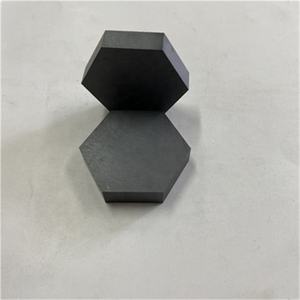
High Fracture Toughness Boron Carbide B4C Ceramic Nozzle
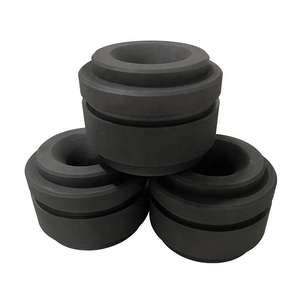
Nano B4C Powder 0.5um Boron Carbide Nanopowder Nano Particles 500 Nano for Ceramic
